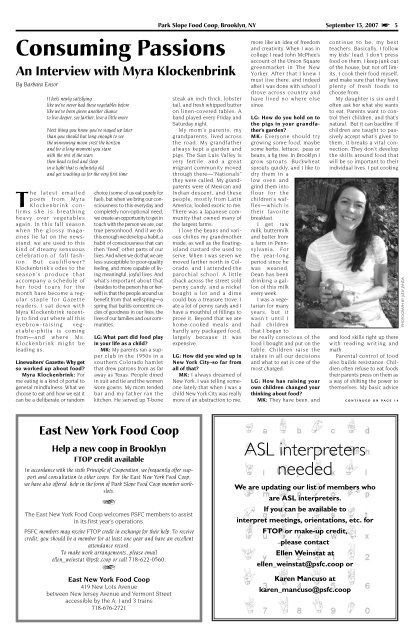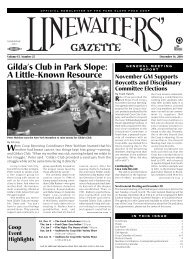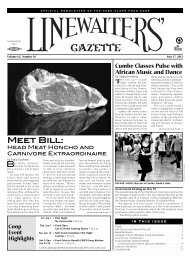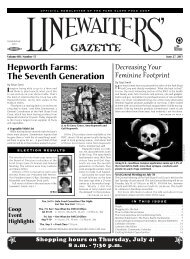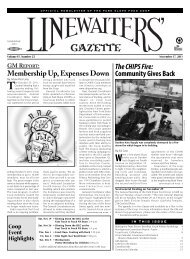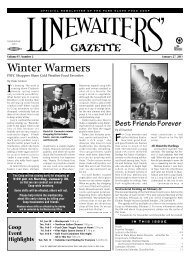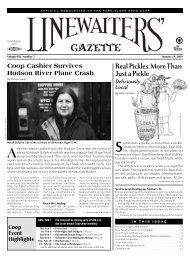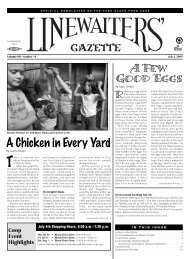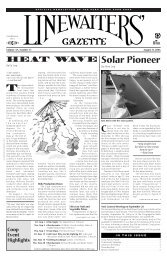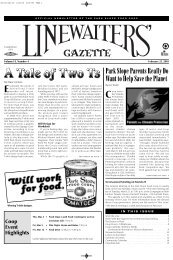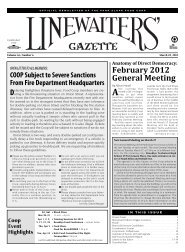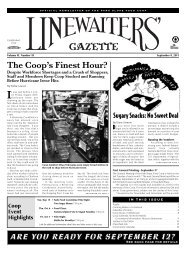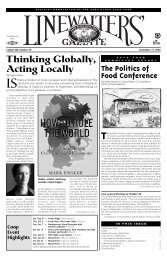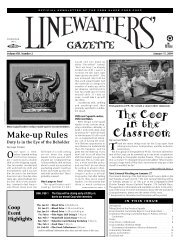The Three Rs - Park Slope Food Coop
The Three Rs - Park Slope Food Coop
The Three Rs - Park Slope Food Coop
You also want an ePaper? Increase the reach of your titles
YUMPU automatically turns print PDFs into web optimized ePapers that Google loves.
<strong>Park</strong> <strong>Slope</strong> <strong>Food</strong> <strong>Coop</strong>, Brooklyn, NY September 13, 2007 5Consuming PassionsAn Interview with Myra KlockenbrinkBy Barbara EnsorIt feels newly satisfyinglike we’ve never had these vegetables beforelike we’ve been given another chanceto live deeper, see farther, love a little moreNext thing you know you’ve stayed up laterthan you should but long enough to seethe winnowing moon crest the horizonand for a long moment you starewith the rest of the starsthen head to bed and sleepin a light that is infinitely oldand yet touching us for the very first time<strong>The</strong> latest emailedpoem from MyraKlockenbrink confirmsshe is breathingheavy over vegetablesagain. In this fall seasonwhen the glossy magazineslie fat on the newsstand,we are used to thiskind of dreamy sensuouscelebration of fall fashion.But cauliflower?Klockenbrink’s odes to theseason’s produce thataccompany a schedule ofher food tours for themonth have become a regularstaple for Gazettereaders. I sat down withMyra Klockenbrink recentlyto find out where all thiseyebrow-raising vegetable-philiais comingfrom—and where Ms.Klockenbrink might beleading us.Linewaiters’ Gazette: Why getso worked up about food?Myra Klockenbrink: Forme eating is a kind of portal togeneral mindfulness: What wechoose to eat and how we eat itcan be a deliberate or randomchoice (some of us eat purely forfuel), but when we bring our consciousnessto this everyday andcompletely non-optional need,we create an opportunity to get intouch with the person we are, ourtrue personhood. And if we dothis enough we develop a habit, ahabit of consciousness that canthen “feed” other parts of ourlives. And when we do that we areless susceptible to poor-qualityfeeling, and more capable of livingmeaningful, joyful lives. Andwhat’s important about that(besides to the person his or herself)is that the people around usbenefit from that wellspring—aspring that builds concentric circlesof goodness in our lives, thelives of our families and our communities.LG: What part did food playin your life as a child?MK: My parents ran a supperclub in the 1950s in asouthern Colorado hamletthat drew patrons from as faraway as Texas. People dinedin suit and tie and the womenwore gowns. My mom tendedbar and my father ran thekitchen. He served up T-bonesteak an inch thick, lobstertail, and fresh whipped butteron linen-covered tables. Aband played every Friday andSaturday night.My mom’s parents, mygrandparents, lived acrossthe road. My grandfatheralways kept a garden andpigs. <strong>The</strong> San Luis Valley isvery fertile, and a greatmigrant community movedthrough there—“Nationals”they were called. My grandparentswere of Mexican andIndian descent, and thesepeople, mostly from LatinAmerica, looked exotic to me.<strong>The</strong>re was a Japanese communitythat owned many ofthe largest farms.I love the beans and variouschilies my grandmothermade, as well as the floatingislandcustard she used toserve. When I was seven wemoved farther north in Colorado,and I attended theparochial school. A littleshack across the street soldpenny candy, and a nickelbought a lot and a dimecould buy a treasure trove. Iate a lot of penny candy and Ihave a mouthful of fillings toprove it. Beyond that we atehome-cooked meals andhardly any packaged food,largely because it wasexpensive.LG: How did you wind up inNew York City–so far fromall of that?MK: I always dreamed ofNew York. I was telling someonelately that when I was achild New York City was reallymore of an abstraction to me,more like an idea of freedomand creativity. When I was incollege I read John McPhee’saccount of the Union Squaregreenmarket in <strong>The</strong> NewYorker. After that I knew Imust live there, and indeedafter I was done with school Idrove across country andhave lived no where elsesince.LG: How do you hold on tothe pigs in your grandfather’sgarden?MK: Everyone should trygrowing some food, maybesome herbs, lettuce, peas orbeans, a fig tree. In Brooklyn Igrow sprouts. Buckwheatsprouts quickly, and I like todry them in alow oven andgrind them intoflour for thechildren’s waffles—whichistheir favoritebreakfast.I get rawmilk, buttermilkand butter froma farm in Pennsylvania.Forthe year-longperiod since hewas weaned,Dean has beendrinking a gallonof this milkevery week.I was a vegetarianfor manyyears, but itwasn’t until Ihad childrenthat I began tobe really conscious of thefood I bought and put on thetable. Children raise thestakes in all our decisionsand what to eat is one of themost charged.LG: How has raising yourown children changed yourthinking about food?MK: <strong>The</strong>y have been, andcontinue to be, my bestteachers. Basically, I followmy kids’ lead. I don’t pressfood on them, I keep junk outof the house, but not off limits.I cook their food myself,and make sure that they haveplenty of fresh foods tochoose from.My daughter is six and Ioften ask her what she wantsto eat. Parents want to controltheir children, and that’snatural. But it can backfire. Ifchildren are taught to passivelyaccept what’s given tothem, it breaks a vital connection.<strong>The</strong>y don’t developthe skills around food thatwill be so important to theirindividual lives. I put cookingand food skills right up therewith reading writing andmath.Parental control of foodalso builds resistance. Childrenoften refuse to eat foodstheir parents press on them asa way of shifting the power tothemselves. My basic adviceCONTINUED ON PAGE 14PHOTOGRAPH BY JUDY JANDAEast New York <strong>Food</strong> <strong>Coop</strong>Help a new coop in BrooklynFTOP credit availableIn accordance with the sixth Principle of <strong>Coop</strong>eration, we frequently offer supportand consultation to other coops. For the East New York <strong>Food</strong> <strong>Coop</strong>,we have also offered help in the form of <strong>Park</strong> <strong>Slope</strong> <strong>Food</strong> <strong>Coop</strong> member workslots.<strong>The</strong> East New York <strong>Food</strong> <strong>Coop</strong> welcomes PSFC members to assistin its first year’s operations.PSFC members may receive FTOP credit in exchange for their help. To receivecredit, you should be a member for at least one year and have an excellentattendance record.To make work arrangements, please emailellen_weinstat @psfc.coop or call 718-622-0560.East New York <strong>Food</strong> <strong>Coop</strong>419 New Lots Avenuebetween New Jersey Avenue and Vermont Streetaccessible by the A, J and 3 trains718-676-2721ASL interpretersneededWe are updating our list of members whoare ASL interpreters.If you can be available tointerpret meetings, orientations, etc. forFTOP or make-up credit,please contactEllen Weinstat atellen_weinstat@psfc.coop orKaren Mancuso atkaren_mancuso@psfc.coop


